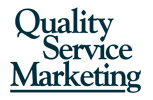I’m delighted to feature Chris Brown, CEO of MarketCulture Strategies, who works with companies to create customer-focused cultures. I met Chris recently and was intrigued with his company’s mission (“Help leaders measure, enhance and maintain a strong market culture as a means of competitive advantage”) and vision (“Spark and sustain a cultural revolution that inspires employees, delights customers & rewards shareholders”).
MarketCulture offers the Market Responsiveness Index, a web-based benchmarking tool that evaluates companies on key characteristics of business performance and competitive advantage. Two of these characteristics are critical to employee engagement:
- Strategic Alignment – how well employees “understand and enact the vision, mission, objectives and strategic direction of the company”
- Cross-Functional Collaboration – how well employees “interact, share information, work with, and assist colleagues from other work groups.”
[Note: this is the first of a two-part interview that focuses on corporate culture and strategic alignment.]
QSM: Chris, let’s start with the big picture. How does corporate culture impact a firm’s success?
Chris: Corporate culture shapes what we do (behavior) and how we do it (performance). Culture is a tough concept for many people to get their hands around, so a simple way to think about it is ‘the way we do things around here.’ Ultimately, it is like an invisible but powerful set of expectations that influences the way people work in organizations.
QSM: Engaging employees requires that they have a clear “line of sight” to the company’s strategy, goals, and objectives. In your experience, what do you find is the biggest obstacle to achieving this strategic alignment?
Chris: The reason alignment can be an issue is simply because of change. The dynamic nature of markets means that companies need to change quickly to lead or adapt to market shifts. Strategic alignment is illusive for most because our success breeds failure. It’s human (and organizational) nature to rely on what has worked in the past. When we are successful, we don’t want to change what we are doing. Instead, focus is often shifted inward toward maximizing dollars from our current alignment. But then once the market shifts, we’re stuck focused inwardly. We’re not ready to respond, so we miss the boat.
[Note: This interview continues in my next post with Chris sharing ideas on effective internal collaboration.]
